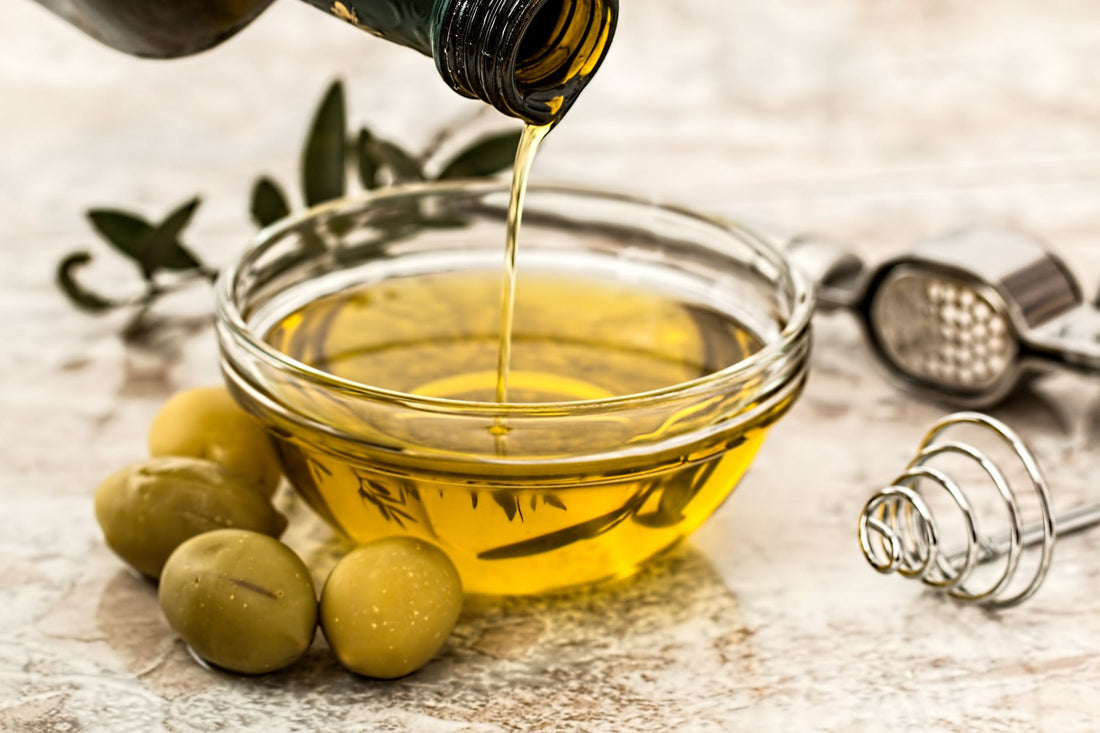Usually associated with food and cooking, olive oil can also be used in aromatherapy, can be used topically, and may provide benefits for some individuals when it comes to their skin and hair.
But is olive oil itself an essential oil?
Olive oil has some similarities to essential oils, however, olive oil is more accurately classified as a carrier oil.
Carrier oils differ from essential oils by the means of which they are extracted, how each of them are used, and how they interact with the skin and their environment.
Essential oils are concentrated extracts from plant materials and if applied directly to the skin can cause irritation or inflation.
Carrier oils are used in aromatherapy as a means of diluting essential oils, and making them more easily tolerable by the skin.
Olive oil as a carrier oil and combined with essential oils, or used by itself, and may help some individuals relieve dry skin and help their skin retain moisture.
How is olive oil made?
Olive oil is typically extracted by means of cold pressing. This is done by first washing then grinding fresh olives into a paste, and the pressing the paste to extract the oil from the pulp.
Essential oils are most commonly extracted by means of steam distillation, but other methods may be used depending on which essential oil is being produced.

What can olive oil be used for?
Olive oil is commonly found in hair care products, lotions, and other skin products and offer some skin benefits including acting as a great moisturizer for dry skin. Olive oil may be exceptionally beneficial if you've experienced prolonged sun exposure and are experience a sunburn.
Olive oil is rich in fatty acids and vitamin E, and like jojoba oil, is similar to the oils our body produces, making it easy to be absorbed into the skin. Other vitamins that are found in olive oil include vitamins A and K, iron, calcium, magnesium and potassium.
Olive oil is also thought to possess antioxidant properties, and when it is directly applied to the skin may help protect it against environmental damage, premature aging, and aid in wound recovery.
Olive oil may also be useful as a natural makeup remover for waxy products such as mascara and eyeliner.
If you want to try using olive oil at home, you can try it first by itself, or incorporate essential oils to add in aromatic benefits. To make sure you dilute to the proper ratio, follow the guidelines suggested by the National Association for Holistic Aromatherapy (NAHA) recommendations.
For a natural body moisturizer for dry skin, try adding your favorite blend of MOXĒ essential oils to your extra virgin olive oil.
What other oils can be beneficial for skin?
With olive oil being primarily useful for those individuals who experience dry skin by helping retain moisture, other oils can be used for other skin types and skin issues.
For individuals who have oily skin, a lighter oil such as grapeseed oil may be beneficial.
If you experience issues with uneven pigments, dark spots, scar marks, or have acne prone skin, rosehip oil may be beneficial.
And for those whose skin may fall somewhere in the middle, jojoba oil can be useful balancing the skin’s moisture levels, and may even help with skin conditions such as eczema and psoriasis. Jojoba oil also contains zinc, copper, vitamin B, and vitamin E, which may help strengthen skin.

Safe Usage
Olive oil is recommended for individuals who typically encounter issues with dry skin. And in contrast, for individuals whose skin is typically oily, or those that have acne prone skin or dermatitis, olive oil typically isn’t considered the best oil for these skin types. Olive oils is also discouraged when it comes to using it topically for infants or young children.
When choosing an olive oil that you are considering to use topically, you typically want to look for extra virgin olive oils that is organic and cold pressed to ensure that it is the best quality.
If you think olive oil may be a good fit for your skin type, start with a few drops. A little goes a long way, and you don’t want to over do it.
Olive oil typically is not associated with skin irritations, however, if you’ve never used olive oil on your skin before, or you have sensitive skin, you may want to start with a patch test. Do this by applying a small amount of the oil to a small patch of skin (such as on the forearm) to see how your skin will react. If you do happen to experience any skin irritations or acne breakouts, you may want to consider discontinuing use.
Olive oils is typically best applied to the skin when it is still a little damp, such as directly out of the shower. After applying olive oil to skin or hair, pat with a damp towel to remove any excess oil.
Conclusion
Olive oil is more accurately classified as a carrier oil instead of an essential oil, it is still naturally derived from raw plant materials. Olive oil is known for its moisturizing benefits when applied to dry skin or hair, and can be combined with essential oils or applied directly to the skin.

